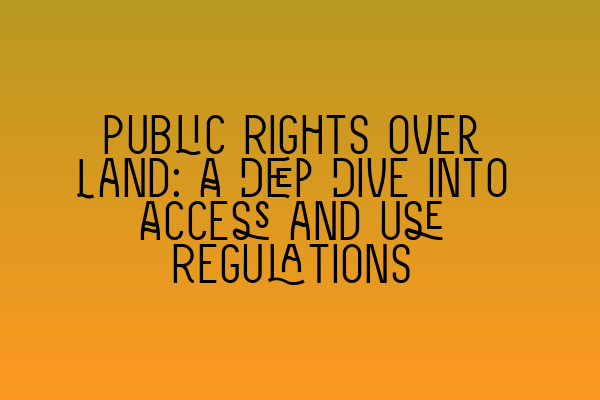Public Rights over Land: A Deep Dive into Access and Use Regulations
Welcome to SQE Property Law & Land Law’s blog, where we explore the intricacies of property law and its various aspects. In this article, we will delve deep into the topic of public rights over land, specifically focusing on access and use regulations. Understanding these regulations is crucial for anyone dealing with property rights, whether you are a landowner, a solicitor, or a potential buyer.
Public rights over land refer to the rights that the general public has to access and use certain areas of land. These rights are granted based on long-standing legal principles and are intended to strike a balance between private landownership and the public’s interest in enjoying and utilizing land.
One important aspect of public rights over land is the right of access. Access rights allow the public to enter and cross private land under certain circumstances. These circumstances differ based on the type of land and the regulations that apply to it. For example, in urban areas, public access is generally limited to designated public spaces like parks and streets, whereas in rural areas, access rights extend to public footpaths and bridleways.
To ensure that access rights are respected and adhered to, there are certain use regulations that govern public behavior on private land. These regulations aim to protect the rights of landowners while allowing the general public to enjoy their access rights. Some common use regulations include:
1. Trespassing Laws: Trespassing refers to the act of entering or remaining on someone else’s property without permission. Landowners have the right to exclude trespassers, and individuals who do not have a lawful reason to be on private land can be held liable for trespassing.
2. Code of Conduct: Many areas with public access rights have specific codes of conduct that users must adhere to. These codes may include guidelines on activities, such as walking dogs on a leash, picking up litter, or not damaging property. It is essential for the public to familiarize themselves with these codes to avoid any legal issues.
3. Conservation Rules: In certain areas, public access rights coexist with the need to protect natural reserves, wildlife habitats, or sensitive ecosystems. Conservation rules may restrict certain activities, such as camping or lighting fires, to prevent harm to the environment.
Understanding these regulations is crucial, as non-compliance can lead to legal consequences. Therefore, whether you are a member of the public exercising your access rights or a landowner concerned about public usage, it is advisable to seek legal advice from a property law solicitor to ensure your rights and obligations are upheld.
At SQE Property Law & Land Law, we specialize in property-related legal matters and provide expert advice to clients across the UK. Our team of experienced solicitors can guide you through the complex world of public rights over land, helping you understand your rights and obligations and providing effective solutions for any disputes that may arise.
If you’re preparing for the SQE 1 or SQE 2 exams, we also offer comprehensive preparation courses to help you excel. Test your knowledge with our SQE 1 Practice Exam Questions or give yourself a realistic exam experience with our SQE 1 Practice Mocks FLK1 FLK2. We understand the importance of proper preparation, and our courses are designed to equip you with the knowledge and skills necessary to succeed.
To stay up to date with the latest SRA SQE Exam Dates and preparation courses, visit our website at SQE Preparation Courses. We are committed to providing valuable resources to aspiring solicitors and ensuring their success in the challenging realm of property law.
In conclusion, public rights over land play a vital role in balancing private landownership and public access. Understanding the access and use regulations is essential for both landowners and the general public to ensure a harmonious relationship between private property rights and public enjoyment. For expert advice on property law matters or comprehensive exam preparation, trust SQE Property Law & Land Law to be your reliable partner.
